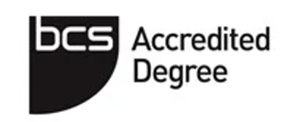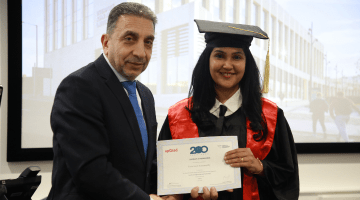Why study this course with LJMU?
- State-of-the-art computing facilities with specialist computer security software
- Practical, hands-on experience incorporated into modules wherever possible
- High quality teaching from staff involved in internationally recognised research.
- Graduates increasingly in demand as IT security problems escalate
- Opportunity to undertake a 12-month paid industrial work placement
- Strong links with local and national organisations including Xyone Security, Fujitsu, IBM, Eutechnyx and Sony Computer Entertainment Europe
- International Foundation Year course available offering direct progression onto this degree programme - visit LJMU's International Study Centre to find out more
- Start month: September
- Campus location: City Campus
About your course
The BSc (Hons) Cyber Security at Liverpool John Moores University is informed by internationally important research, which means your studies will be at the forefront of developments in this important field. The course is accredited by the British Computer Society (BCS).
As we increase the scope of our working and personal lives online there has been a rise in the number of attacks being made against information systems by hackers and other criminals looking to steal resources. It seems that on a weekly basis there is another news story detailing a new ransomware attack or a new vulnerability in a piece of software used by the public.
The UK government has identified a skills gap and therefore a need for more staff trained in Computer Security. Students graduating from the Computer Security course will be in demand by companies looking to fill their Computer Security roles with trained staff. LJMU has a growing national and international reputation for its research into computer security and this expertise ensures the degree is at the leading edge of developments in this discipline.
About the BSc (Hons) Cyber Security Degree
The Cyber Security course will teach you the skills required to be able to identify Computer Security issues, how to solve these issues and how to recover if a Security breach occurs. Students will learn some Digital Forensics skills to help them identify where attacks are being launched from and ways to secure their systems against them. There is a close relationship between Digital Forensics and Cyber Security, and it is necessary that professionals in both areas are aware of each others roles in securing computing systems.
Students will study Cyber Security topics such as Penetration Testing, Secure Software Development, Ethical Hacking, Applied Cryptography and Network Forensics. Modules will teach the required practical skills and the theory that underpins this material, as well as understanding of the business context for security. The modules are informed by internationally recognised research by the staff who teach the modules.
The Cyber Security modules are complemented by modules in Computer Science. We balance the specialist skills of Computer Security with broader topics in Computer Science such as Operating Systems, Databases Systems, Programming, and Computer Systems, that are required as context for applying security skills.
The curriculum is informed by consultancy with Fujitsu and Computer Security companies within the local area. This ensures that the course is up to date and producing students who can go straight into the industry.
Work-related Learning
Practical, hands-on experience to boost your employability is incorporated into this programme wherever possible. However the best way to really get a taste of working in the computer security industry or the IT industry in general is to take a year out after your second year and spend 12 months on supervised work placement.
This invaluable experience gives you a chance to put into practice the many concepts and techniques you have learnt on the course, as well as developing new skills. We highly recommend that you take up this opportunity, as it will greatly enhance your prospects when you come to negotiate your way around the competitive graduate job market.
Dedicated Facilities
There is a dedicated Cyber Security lab with its own private internal network that students can use to run experiments and look at the ways in which malware works. We teach Ethical Hacking using a virtual environment and this gives students a good practical experience of Ethical Hacking in the real world.
Upon Graduation
Students who graduate from the Cyber Security course are normally in work or further study within 12 months of graduating. Students on the course develop problem solving skills that are transferrable to employment, both in Computer Security and outside of the industry. Students have gained employment recently with GCHQ, Microsoft, Google, Ratheon, BT and Very. Students who continue onto further study have either started a masters course, PGCE or a PhD.
Course modules
What you will study on this degree
Further guidance on modules
Modules are designated core or optional in accordance with professional body requirements, as applicable, and LJMU’s Academic Framework Regulations. Whilst you are required to study core modules, optional modules provide you with an element of choice. Their availability may vary and will be subject to meeting minimum student numbers.
Where changes to modules are necessary these will be communicated as appropriate.
Core modules
Core modules
Optional Modules
Core modules
Professional accreditation/links
Accredited by BCS, The Chartered Institute for IT for the purposes of fully meeting the academic requirement for registration as a Chartered IT Professional.

Your Learning Experience
Excellent facilities and learning resources
We adopt an active blended learning approach, meaning you will experience a combination of face-to-face and online learning during your time at LJMU. This enables you to experience a rich and diverse learning experience and engage fully with your studies. Our approach ensures that you can easily access support from your personal tutor, either by meeting them on-campus or via a video call to suit your needs.
You will begin the course with a 3 day induction and then spend approximately 15 hours per week in the classroom. Independent study is a fundamental element of the course and accounts for about 70% or around 35 hours of your weekly study time. Teaching is mostly via lectures with more informal lab sessions, online activities and small-group tutorials to reinforce ideas discussed in the lectures and to give you a chance to develop ideas with staff and other students.
Work-related Learning
Practical, hands-on experience to boost your employability is incorporated into this programme wherever possible. However the best way to really get a taste of working in the cyber security industry or the IT industry in general is to take a year out after your second year and spend 12 months on supervised work placement. This invaluable experience gives you a chance to put into practice the many concepts and techniques you have learnt on the course, as well as developing new skills. We highly recommend that you take up this opportunity, as it will greatly enhance your prospects when you come to negotiate your way around the competitive graduate job market.
Dedicated personal tutor, plus study skills support
Each student on the course is assigned a personal tutor during the induction week of their first year on the course. The personal tutor will help you settle into study at LJMU and advise you on any issues that arise that you require advice. They will have regular meetings with you, discuss your progress and give advice on how to improve your work.
Should you choose to undertake a years work placement, this support will continue as a supervisor that will stay in close contact during your placement.
Your lecturers
We are proud of our academic staffs high quality teaching standards and approachability. Informal staff-student relationships are excellent. If you decide to study within the School of Computer Science and Mathematics, you will be joining a relaxed and friendly environment in which staff are committed not only to their students welfare but also to ensuring that courses are continually developed to meet the needs of employers.
Assessment varies depending on the modules you choose, but will usually include a combination of exams and coursework.
You will be assessed by a combination of coursework and exams plus an independent final year project which contributes substantially to your final mark. Your tutors will give prompt and constructive feedback via Canvas (our virtual learning environment), face-to-face or in writing. This will help you to identify your strengths as well as the areas where you may need to put in more work.
Career prospects
Security is often cited among the top five IT skills demanded by employers. The need to improve knowledge and education in computer security has long been acknowledged. This means that potential careers open to you as a graduate of this programme are wide ranging and include: information security analyst computer security consultant guiding cyber security initiatives network or system administrator network security management software or web developer data analyst, data recovery, data mining. Alternatively, many of our graduates continue their studies with a masters or research programme.
Where you will study
This programme is delivered in the Byrom Street complex of LJMUs City Campus. Here you'll find high quality lecture theatres, meeting and seminar rooms plus social spaces and a large café. The Avril Robarts Library is just minutes away on Tithebarn Street.


LJMU has a growing national and international reputation for its research into cyber security and this expertise ensures the degree is at the leading edge of developments in this discipline.
Career paths
Security is often cited among the top five IT skills demanded by employers.
The need to improve knowledge and education in cyber security has long been acknowledged. This means that potential careers open to you as a graduate of this programme are wide ranging and include:
- information security analyst
- computer security consultant
- network or system administrator
- software or web developer
- data analyst, data recovery, data mining
- police force intelligence officer
- guiding cyber security initiatives
- computer forensic analyst
- network security management
- education provision
- IT project manager
Alternatively, many of our graduates continue their studies with a masters or research programme.
Student Futures - Careers, Employability and Enterprise Service
A wide range of opportunities and support is available to you, within and beyond your course, to ensure our students experience a transformation in their career trajectory. Every undergraduate curriculum includes Future Focus during Level 4, an e-learning resource and workshop designed to help you to develop your talents, passion and purpose.
Every student has access to Careers Zone 24/7, LJMU's suite of online Apps, resources and jobs board via the LJMU Student Futures website.
Tuition fees and funding
- Full-time per year:
- £9,535
- Placement year:
- £1,905
The University reserves the right to increase tuition fees in accordance with any changes to the maximum allowable fees set by the UK Parliament. In the event of such a change, any fee increase will be subject to a maximum cap of 10% of the total course cost as originally stated at the time of your offer.
The fees quoted above cover registration, tuition, supervision, assessment and examinations as well as:
- library membership with access to printed, multimedia and digital resources
- access to programme-appropriate software
- library and student IT support
- free on-campus wifi via eduroam
Additional costs
Although not all of the following are compulsory/relevant, you should keep in mind the costs of:
- accommodation and living expenditure
- books (should you wish to have your own copies)
- printing, photocopying and stationery
- PC/laptop (should you prefer to purchase your own for independent study and online learning activities)
- mobile phone/tablet (to access online services)
- field trips (travel and activity costs)
- placements (travel expenses and living costs)
- student visas (international students only)
- study abroad opportunities (travel costs, accommodation, visas and immunisations)
- academic conferences (travel costs)
- professional-body membership
- graduation (gown hire etc)
Funding
There are many ways to fund study for home and international students. From loans to International Scholarships and subject-specific funding, you'll find all of the information you need on our specialist funding pages.
Entry requirements
Please choose your qualifications below to view requirements
Grades/points required from qualifications: BBC-ABB (112-128)
Work out how many UCAS points your qualifications are worth by visiting the UCAS Tariff Calculator.
Qualification requirements
How to apply
Securing your place at LJMU
UCAS is the official application route for our full-time undergraduate courses. Further information on the UCAS application process can be found here https://www.ljmu.ac.uk/study/undergraduate-students/how-to-apply.
Your university life
From accommodation and academic support to clubs and societies. Find out what LJMU has to offer.
Related Links
Talk to our students
Connect with a current LJMU student for advice and guidance on university life, courses and more.
See what our students are saying
At LJMU we want you to know you're making the right choice by studying with us. You can see what our students are saying about their experience with us through their reviews on the following websites:
Related Links
News and views
Browse through the latest news and stories from the university
The university reserves the right to withdraw or make alterations to a course and facilities if necessary; this may be because such changes are deemed to be beneficial to students, are minor in nature and unlikely to impact negatively upon students or become necessary due to circumstances beyond the control of the university. Where this does happen, the university operates a policy of consultation, advice and support to all enrolled students affected by the proposed change to their course or module.
Further information on the terms and conditions of any offer made, our admissions policy and the complaints and appeals process.


































